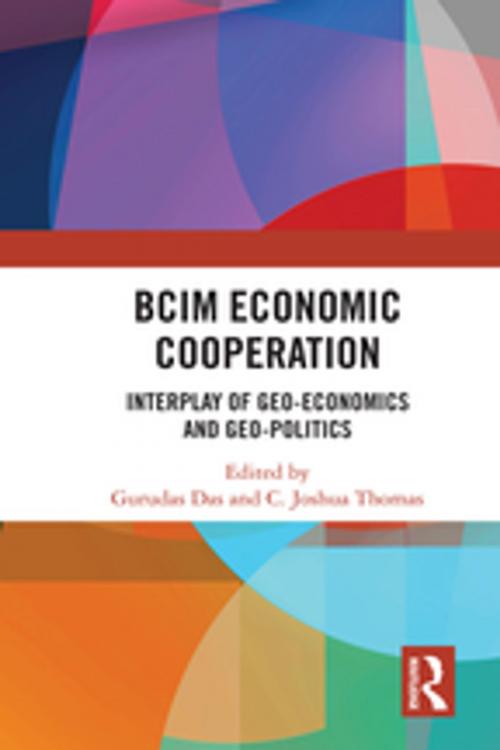BCIM Economic Cooperation
Interplay of Geo-economics and Geo-politics
Business & Finance, Economics, Economic Development, Nonfiction, Social & Cultural Studies, Political Science, Politics, Economic Policy, Social Science| Author: | ISBN: | 9780429801020 | |
| Publisher: | Taylor and Francis | Publication: | September 3, 2018 |
| Imprint: | Routledge India | Language: | English |
| Author: | |
| ISBN: | 9780429801020 |
| Publisher: | Taylor and Francis |
| Publication: | September 3, 2018 |
| Imprint: | Routledge India |
| Language: | English |
This book examines the strategic and economic logic behind the Bangladesh–China–India–Myanmar (BCIM) Regional Cooperation. According to estimates, BCIM covers approximately 9 percent of the world’s mass and 40 percent of the world’s population spanning across four countries, constituting the confluence of East, Southeast and South Asia. It contributes about 13 percent to world trade but ironically only 5 percent to inter-regional trade. This volume compares the various approaches to cooperation – trade-led vs project-led, geo-political vs geo-strategic, Sino-centric vs India-led.
The chapters explore the complex interplay of geo-economics and geo-politics associated with BCIM sub-regional cooperation in general, and the BCIM Economic Corridor (BCIM-EC) in particular. It points to the current challenges that impede globalisation and economic growth, and critically reviews implications for the stakeholders, institutional frameworks and the spatial impact of the Corridor, especially on the underdeveloped regions. The book discusses the geo-political, geo-economic and geo-strategic advantages that will accrue to the member countries once the sub-regional cooperation becomes fully functional. It advocates the adoption of best practices from similar sub-regional groupings across the globe.
This book will be of great interest to scholars and researchers of politics and international relations, geo-politics, strategic studies, sub-regional cooperation, South Asian studies, India–China relations, foreign trade and economics, besides those dealing with foreign policy and development cooperation. It will especially benefit policymakers, development agencies and strategic think tanks.
This book examines the strategic and economic logic behind the Bangladesh–China–India–Myanmar (BCIM) Regional Cooperation. According to estimates, BCIM covers approximately 9 percent of the world’s mass and 40 percent of the world’s population spanning across four countries, constituting the confluence of East, Southeast and South Asia. It contributes about 13 percent to world trade but ironically only 5 percent to inter-regional trade. This volume compares the various approaches to cooperation – trade-led vs project-led, geo-political vs geo-strategic, Sino-centric vs India-led.
The chapters explore the complex interplay of geo-economics and geo-politics associated with BCIM sub-regional cooperation in general, and the BCIM Economic Corridor (BCIM-EC) in particular. It points to the current challenges that impede globalisation and economic growth, and critically reviews implications for the stakeholders, institutional frameworks and the spatial impact of the Corridor, especially on the underdeveloped regions. The book discusses the geo-political, geo-economic and geo-strategic advantages that will accrue to the member countries once the sub-regional cooperation becomes fully functional. It advocates the adoption of best practices from similar sub-regional groupings across the globe.
This book will be of great interest to scholars and researchers of politics and international relations, geo-politics, strategic studies, sub-regional cooperation, South Asian studies, India–China relations, foreign trade and economics, besides those dealing with foreign policy and development cooperation. It will especially benefit policymakers, development agencies and strategic think tanks.















